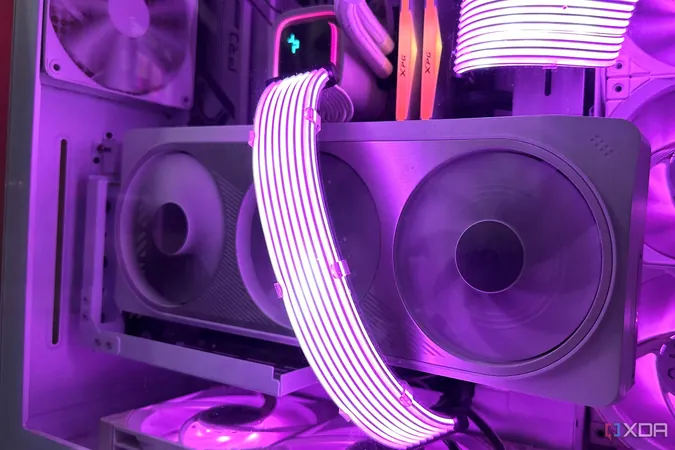
5 Times Gaming PCs Were Pronounced Dead in the Last 30 Years: The Undying Legacy of PC Gaming!
2025-04-06
Author: Wei
5 Times Gaming PCs Were Pronounced Dead in the Last 30 Years: The Undying Legacy of PC Gaming!
Over the past three decades, the gaming world has seen some monumental shifts, and at each turn, media sources have declared the death of PC gaming and gaming PCs. From the console explosions of the 90s to the mobile gaming craze of the 2010s, these declarations are steeped in a mix of fact and hyperbole, often missing the bigger picture of innovation and adaptation in the gaming industry.
1. The 1990s: Consoles Rule the Roost
The late 1980s and early 90s were pivotal for gaming as the Nintendo Entertainment System (NES) and later systems like the Super Nintendo and the Sony PlayStation captured the hearts of gamers everywhere. Many thought these consoles would render PCs obsolete due to their ease of use and affordability. But while Nintendo breathed new life into the gaming market post-1983 crash, groundbreaking first-person shooters like Doom and Wolfenstein 3D kept the flames of PC gaming alive. Gamers returned to their PCs for the adrenaline rush only they could provide, proving that the personal computer had far more to offer than anyone anticipated.
2. Early 2000s: The Piracy Panic
As broadband internet became more mainstream, so too did the threat of piracy. With peer-to-peer file-sharing programs like BitTorrent, many analysts claimed that piracy would lead to the demise of PC gaming. Yet, this moment also saw the dawn of platforms like Steam, which transformed how games were sold and distributed, offering developers new ways to monetize and protect their work. The fears surrounding piracy ultimately led to stronger anti-piracy measures and a new era of digital gaming that solidified the PC's standing.
3. Mid-to-Late 2000s: Consoles Dominate Development
The arrival of the Xbox 360 and PlayStation 3 ushered in a phase where many developers leaned towards console releases, much to the chagrin of PC gamers. The era was marred by poorly optimized PC ports, leading to significant disappointment among players. However, as history shows, this trend didn’t last. Community engagement and modding revitalized PC gaming, while indie developers flourished in this environment, counteracting claims that PC gaming was becoming a secondary consideration.
4. 2010s: The Mobile Gaming Invasion
The smartphone revolution led to a dramatic shift in gaming preferences, as titles like Angry Birds and Fortnite took the world by storm. Analysts cautioned about the decline of gaming PCs as mobile devices offered affordable and convenient gaming options. However, free-to-play giants grew alongside traditional PC titles such as Dota 2 and League of Legends, which continued to thrive in this landscape. The hybrid gaming experience became the norm, proving that PC gaming wasn’t as vulnerable as many claimed.
5. The 2020s: The Rise of Crippled Launches and Price Hikes
The most recent wave of 'doom' for gaming PCs emerged amid a turbulent landscape of skyrocketing GPU prices and notoriously buggy game launches, particularly with titles like Cyberpunk 2077. The backlash from players and critics alike seemed to predict a grim future for PC gaming. Nonetheless, the market remains resilient; demand for high-performance gaming hardware has shown no signs of abating, and many games, once patched, have gone on to achieve roaring successes.
In conclusion, the pronouncements of doom regarding gaming PCs have been a constant theme in the last 30 years, but the medium has proven to be incredibly adaptable. While challenges always loom, the gaming landscape continues to evolve, demonstrating that PC gamers are here to stay! As technology advances and innovation continues, one question remains: Is PC gaming too big to fail? The answer appears to be an emphatic YES!






 Brasil (PT)
Brasil (PT)
 Canada (EN)
Canada (EN)
 Chile (ES)
Chile (ES)
 Česko (CS)
Česko (CS)
 대한민국 (KO)
대한민국 (KO)
 España (ES)
España (ES)
 France (FR)
France (FR)
 Hong Kong (EN)
Hong Kong (EN)
 Italia (IT)
Italia (IT)
 日本 (JA)
日本 (JA)
 Magyarország (HU)
Magyarország (HU)
 Norge (NO)
Norge (NO)
 Polska (PL)
Polska (PL)
 Schweiz (DE)
Schweiz (DE)
 Singapore (EN)
Singapore (EN)
 Sverige (SV)
Sverige (SV)
 Suomi (FI)
Suomi (FI)
 Türkiye (TR)
Türkiye (TR)
 الإمارات العربية المتحدة (AR)
الإمارات العربية المتحدة (AR)